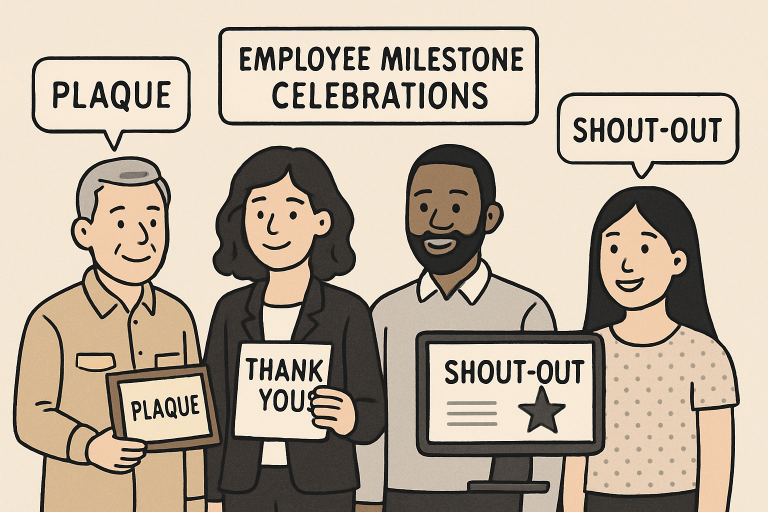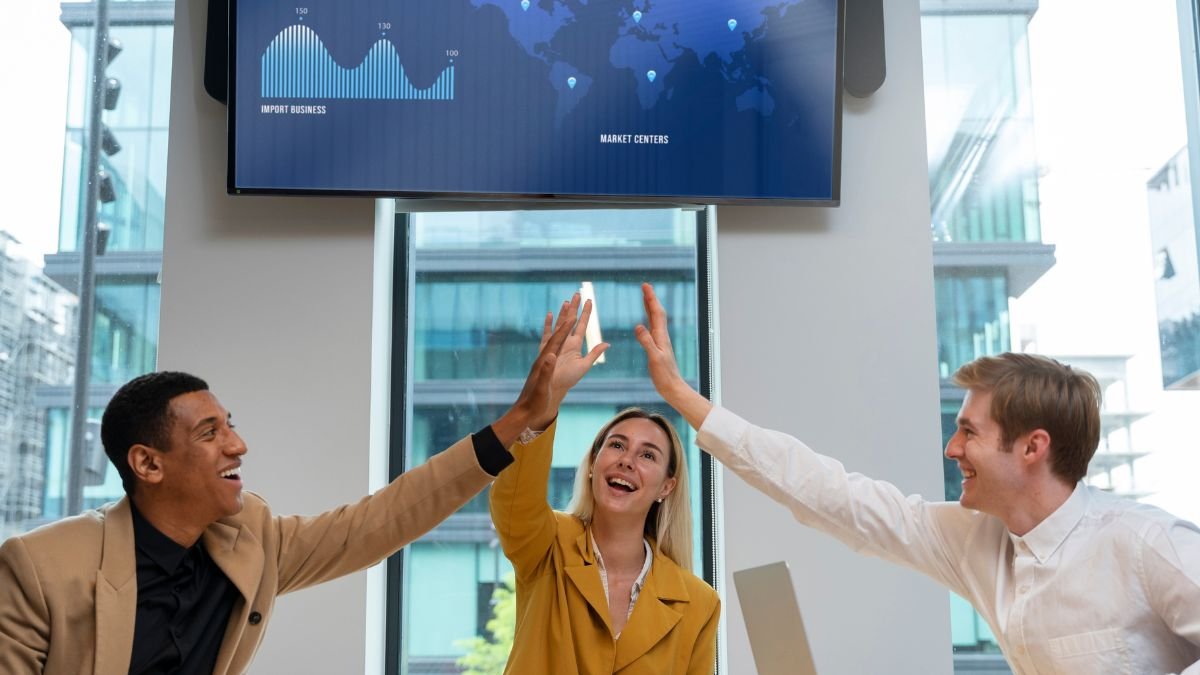Key Takeaways
- Traditional service awards may not resonate with younger employees.
- Personalized recognition enhances employee engagement and motivation.
- Integrating technology can modernize milestone celebrations.
- Regular feedback and appreciation are essential for maintaining morale.
Table of Contents
- Rethinking Traditional Service Awards
- Personalization in Recognition
- Leveraging Technology for Modern Recognition
- Importance of Regular Feedback and Appreciation
- Conclusion
Recognizing significant milestones in an employee’s journey is more than a time-honored tradition—it’s crucial to strengthening morale and boosting retention. As work environments continue to evolve rapidly, especially with the rise of hybrid and remote roles, the need for meaningful acknowledgment has never been greater. Modern organizations are reimagining the celebration of achievements and shifting away from a one-size-fits-all mentality. Instead of relying solely on customary gifts or certificates, forward-thinking companies are investing in engraved years-of-service plaques and unique experiences that truly reflect an employee’s distinctive contributions. Such personalized touches can include crafted messages from leadership or moments in team meetings that spotlight an employee’s journey. These efforts show a genuine recognition of the individual rather than simply the passage of time, helping employees feel truly valued and appreciated, and ultimately making every milestone more memorable and impactful.
Traditional service awards are outdated for younger generations, who value ongoing engagement, growth opportunities, and meaningful interactions over tenure recognition. Innovative companies are reshaping how organizations celebrate success by tailoring recognition to each employee and integrating it into the daily workplace. This creates a dynamic environment where morale remains high and enthusiasm for work continually grows, supporting both the company’s goals and employees’ personal aspirations. Research from Forbes shows that personalized appreciation drives positive outcomes beyond surface-level satisfaction, such as company loyalty, productivity, and increased worker motivation. To ensure long-term employee retention and satisfaction, organizations must balance tradition and innovation, finding new ways to celebrate everyday achievements while marking major career milestones. Acknowledging day-to-day excellence and significant anniversaries clearly conveys that each employee’s contributions matter and solidifies a workplace culture.
Rethinking Traditional Service Awards

For decades, service awards were predominantly presented at standard intervals—most often every five or ten years of employment. However, the modern workplace landscape is changing significantly, and so are employee expectations. Millennials and Gen Z, who now make up a substantial portion of the workforce, seek recognition earlier and more frequently. According to the Society for Human Resource Management, traditional timelines for service awards no longer align with the average employee’s job tenure, which is now often less than five years. Delaying acknowledgment until a five-year milestone may cause employees to feel undervalued, especially those who thrive on more regular feedback and affirmation. Responsive organizations adapt by recognizing achievements at shorter service increments—such as the first, third, or even monthly anniversaries—and infusing gratitude into the daily culture instead of reserving appreciation for major milestones alone. This approach not only honors employees who may not stay long enough for traditional awards but also encourages a culture of continuous recognition and motivation throughout an employee’s tenure.
Personalization in Recognition
A personalized approach to employee recognition goes far beyond picking an item from a standard catalog. Today’s companies understand the importance of tailoring awards to reflect individual preferences, achievements, and personalities. Allowing employees to influence how they are recognized—such as choosing between a memorable experience, a donation to a charity aligned with their values, or a customized item for their workspace—demonstrates deep respect and appreciation for their uniqueness. Some organizations offer unique opportunities, like lunch with the CEO or shout-outs at all-company meetings. These personalized programs have a measurable impact: Gallup research indicates that employees who feel “seen” as unique contributors are significantly more likely to remain engaged, recommend their workplace to others, and attain higher performance levels. Recognizing unique strengths or specific accomplishments, rather than generic years of service, makes the recognition meaningful and memorable for the individual while encouraging them to continue making valuable contributions.
Leveraging Technology for Modern Recognition
The digital era brings new tools for amplifying and streamlining recognition. Companies are utilizing dedicated platforms for peer-to-peer acknowledgments, mobile apps that enable instant kudos, and social feeds that broadcast milestones company-wide. These technologies make it easy for employees at all levels to celebrate colleagues’ contributions in real time, regardless of location or time zone. For example, a manager in New York can immediately recognize a team member in London through a shared platform, bridging the gap between remote and on-site teams. Social collaboration tools like Slack or Microsoft Teams are increasingly being used for sharing public shout-outs and creating a culture of appreciation that is both visible and immediate. Digitizing recognition programs also brings the advantage of easy tracking and measurement, allowing HR teams to analyze engagement trends, identify top performers, and ensure reward strategies are both fair and effective. As noted by the Harvard Business Review, visibility and transparency are critical for successful recognition initiatives—and modern technology is essential for bringing recognition into the spotlight and making it a central part of everyday work life.
Importance of Regular Feedback and Appreciation
While commemorating major milestones is important, research shows that smaller, more frequent gestures of appreciation are just as vital for keeping morale high and teams engaged. Regular feedback—which might take the form of verbal praise during one-on-one meetings, a hand-written note of thanks left on a desk, or a celebratory emoji-filled message in a group chat—reinforces that employees’ everyday efforts are valued and significant. Experts from Inc. suggest integrating recognition into daily management routines—rather than treating it as a quarterly or annual task—creates sustained engagement, higher productivity, and increased loyalty. In workplaces where appreciation is habitual, employees develop a deeper sense of trust, psychological safety, and resilience, enabling organizations to better weather challenges and change. Over time, this culture of frequent feedback and recognition nurtures not just individual growth but also a sense of belonging and shared mission within the broader organization.
Conclusion
Employee milestone recognition is evolving—from infrequent, traditional awards to frequent, highly personalized, and tech-enabled acts of appreciation. By rethinking the nature of service awards, embracing the power of personalization, leveraging digital tools, and making recognition a daily workplace habit, organizations equip themselves to meet the expectations of modern employees and ensure that everyone, regardless of background or tenure, feels seen, valued, and inspired to contribute. Ultimately, these innovative strategies aren’t just good for employees—they result in higher retention, improved performance, and the creation of supportive, thriving workplace cultures that stand the test of time.
“In a world of instant takes and AI-generated noise, John Authers writes like a human. His words carry weight—not just from knowledge, but from care. Readers don’t come to him for headlines; they come for meaning. He doesn’t just explain what happened—he helps you understand why it matters. That’s what sets him apart.”

